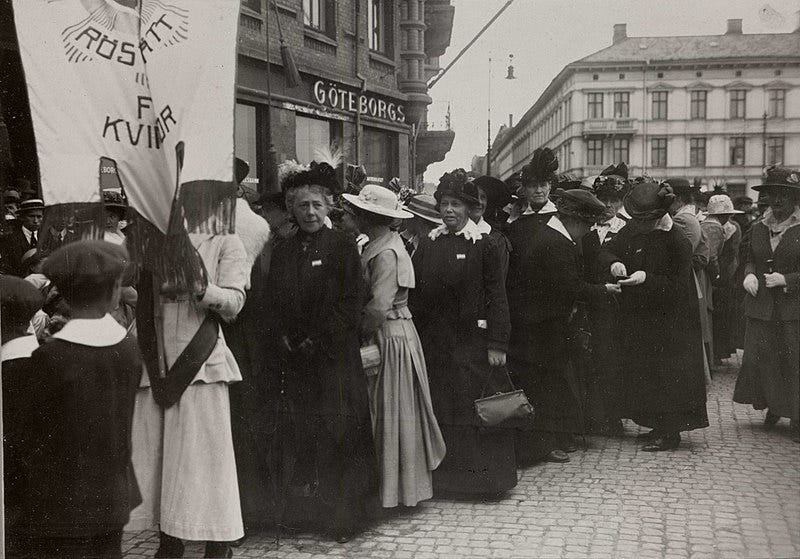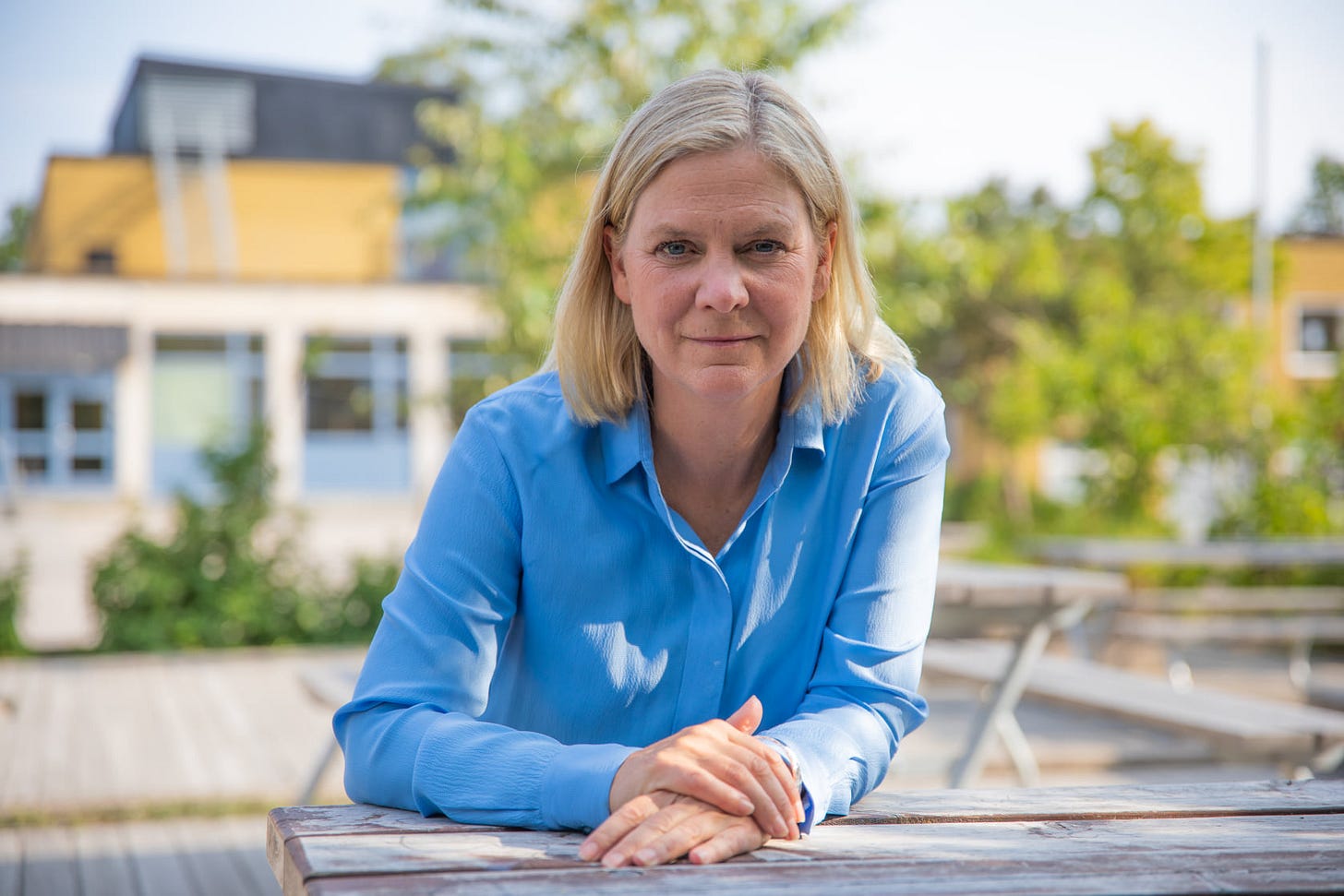Sweden gets another shot at fixing the representation anomaly in its politics, and other stories
#WomenLead (Issue 64): Your weekly round-up on women in politics
Hello, and welcome to Issue 64!
In India, a proposed law to introduce a quota for women in national and state legislatures has been pending for many years now. Most political parties - including the ruling BJP - say they support it and often include it in their election manifestos.
A month ago, on July 28, Indian MP Kanimozhi asked the government a question about the status of the quota bill during a Parliamentary session. “Gender justice is an important commitment of the government,” the written reply came. “The issue involved needs careful consideration on the basis of the consensus among all political parties before a Bill for amendment in the Constitution is brought before Parliament.”
“Careful consideration”, “consensus”, “important commitment”: 👀 enough words to make one curious. So, I spent some time digging up previous instances of the same question being asked in Parliament. I found 22 such questions over the last seven years, and guess what, they all had pretty much repetitive and templated answers! You can read more on that in my piece for The Indian Express.
In this edition, we bring news from Afghanistan, Czech Republic, Iraq, and Samoa, and we turn the spotlight on Sweden. [Our last week’s edition, which focused on Fiji, was our most read issue ever! Thank you for sharing it. In case you missed it, you can read it here.]
If you find our work worthwhile and would like to support this initiative, please upgrade to a paid subscription of the newsletter. It will only strengthen our work and help us stay sustainable. Thank you!
Quick Updates
😂 LOL: In a rather bizarre development, former Samoan Prime Minister Tuila’epa Sailele has accused New Zealand PM Jacinda Ardern of interfering in Samoa’s politics due to a “blind obsession” of bringing in a female prime minister.
Regular readers of #WomenLead might remember that Sailele took quite some time and effort to cede power after the recent election where the opposition led by Naomi Mata’afa (now Samoa’s first woman PM) won.
“This blind obsession with the advent of a woman PM for the first time in Samoa’s political history has blinded Prime Minister Ardern’s judgment in the exercise of caution when it comes to Samoan politics, which is always fraught with a deep and complex culture - that much more lies beneath the surface,” an official statement of his party said, according to the Asia Pacific Report.
Sailele alluded to the “unprecedented haste” shown by Ardern in congratulating Mata’afa after she was declared the PM!
👏 NEW RECORD: In some encouraging news, a record number of women will be contesting the general election in Czech Republic in October. Women make up 31.7 percent of all candidates, the highest for the country so far. We wish them all the best!
🛑 A STEP BACK: However, things are not as gladdening in Iraq, which will also hold an election in October. The number of women contesting will be less than half that of the number from the previous election, according to a report in The Arab Weekly. Women made up 28.8 percent of the candidates in the 2018 election, while this year only 18 percent candidates are women. One-fourth of seats of Iraq’s Parliament are reserved for women.
🥀 IN NEED OF REFUGE: The Taliban’s rise to power in Afghanistan is pushing its former women politicians to find ways of staying safe and also fighting for their people. Reading the news about them makes one shudder at what the future holds.
Fawzia Koofi remains in the country even as she makes efforts to get people out to safer places. Parliamentarian Anarkali Kaur Honaryar (the first non-Muslim woman to be MP in the country) is in India and got emotional when she shared she did not get the time to take a fistful of her country's soil as she left. Zarifa Ghafari, one of the first women mayors, is now in Germany, and hopes that she would be able to draw attention to the situation of the women while in exile. Rangina Kargar, another MP, was deported and sent back to Istanbul by India even though she was travelling with a diplomatic passport. She had come to India for a medical appointment and was supposed to return after that. The Indian government later admitted that the deportation was due to an error, and has offered her an emergency visa.
Spotlight: SWEDEN 🇸🇪🇸🇪🇸🇪
As many as 119 countries have never had a woman leader, a UN Women report said earlier this year. Did you know that one of them is Sweden, otherwise known for its high scores on most gender equality indices? Hopefully, that might change soon.
Prime Minister Stefan Lofven announced last weekend that he would step down from his position in November. Magdalena Andersson, currently the Finance Minister, is being widely speculated to succeed him.
Women make up 47 percent of the members of Riksdag (Sweden’s Parliament), and the country ranks seventh in the world on women’s representation in national legislatures. Sweden has consistently been among the best in the world on this metric. Even better, 54 percent of the ministers are women.
And yet, the prime ministerial position has remained all-elusive, even as several male leaders have openly identified as feminist, and the country also follows a feminist foreign policy.
Can Andersson change the status quo?
She is a trained economist and has been appreciated for her management of the economy during the Covid-19 pandemic, and has often been praised by Lofven as well. In January, she also took over as the Chair of the International Monetary and Financial Committee, the primary advisory body of the International Monetary Fund.
If she secures the support of the party and then Parliament, Sweden will (finally) end the aberration. All other Nordic countries - Finland, Norway, Iceland and Denmark - are currently led by women. It would also be serendipitous since 2021 marks 100 years of women getting the right to vote in the country, and also of the first women getting elected to Parliament.

But this is not the first time that Sweden has come so close to getting a female prime minister, notes a report in The Telegraph.
Mona Sahlin, Anna Kinberg Batra, and Annie Lööf were also set to break the ceiling in the past, but were unable to. Anna Lindh, another popular politician and widely seen as a potential PM, was brutally murdered in 2003. In Sahlin’s case, there was an expenses scandal. For Kinberg Batra, it was her party’s disapproval of her starting talks with the far-right Sweden Democrats. But of course, it wasn’t only their politics.
In a column in Aftonbladet assessing Andersson’s plusses and minuses as potential PM, columnist Lena Mellin writes that Andersson lacks “charm”.
“Ett leende gör ofta livet lite, lite lättare. Det gäller fler sektorer inom politiken. Det borde ‘Magda’ påminna sig om,” writes Melling. (“A smile often makes life a little, a little easier. This applies to more sectors of politics. "Magda" should be reminded of that.”)**
In the past, Kinberg Batra had also been criticized for being “unsmiling”, The Telegraph notes. “You are damned if you do and damned if you don't,” Drude Dahlerup, a politics professor, told the newspaper. “If she had smiled as much as Mona Sahlin did, people would have said she was not really serious.”
However, the situation may well be different this time. There is enough attention to the fact that when it comes to having a female prime minister, Sweden stands out as an exception on the wrong side in the region. Let’s hope it will no longer be so!
Video of the week
This documentary by DW explores why there aren’t more women in German politics. Also read our edition on this subject: No dearth of misogyny for women in German politics even after 16 years of Merkel.
That’s a wrap for this week! If you liked reading this issue, press the like ❤️ button, and forward this to a friend/colleague or share it on your social media - reader endorsement is the only way newsletters grow!
A big thank you to every one who has upgraded to a paid subscription. Every week, we put together this newsletter with a lot of love and hard work. Your payments have only strengthened our resolve. If you would like to support out work, please upgrade to a paid subscription plan. Thank you! We’ll see you next weekend with Issue 65!
**Translated to English with the help of Google Translate. In case of an error, please help us rectify it. To help us cover updates not covered in English, sign up to be a #WomenLead volunteer.




